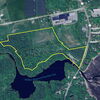Processing Your Payment
Please do not leave this page until complete. This can take a few moments.
- News
-
Editions
View Digital Editions
Biweekly Issues
- November 17,2025
- November 03, 2025
- October 20, 2025
- October 6, 2025
- September 22, 2025
- September 8, 2025
- + More
Special Editions
- Lists
- Viewpoints
-
Our Events
Event Info
Award Honorees
- Calendar
- Biz Marketplace
A Hazy Future | Washington County debates whether big or small is the right approach to economic development
Though he's keeping busy, Whitney says he's not raking in money. Sure, he says, he makes a comfortable living, and he's likely doing a lot better than many residents of Washington County, which has the state's highest unemployment rate and a history of economic woes largely due to the high number of jobs ˆ from aquaculture to manufacturing ˆ that have vanished in recent years. But Whitney characterizes earning a living in Washington County as a hardscrabble existence. He says that the inherent difficulties of doing business downeast ˆ including the county's relatively small skilled workforce ˆ are compounded by statewide challenges facing business owners, such as a high tax burden and a difficult regulatory environment. "It's a tough place to do business," he says. "I'm trying to please my customers, be a good employer, a good family man and a good corporate citizen. But it's a helluva job."
In recent months, a handful of projects have been proposed that may inject some life into Washington County's dreary economy. The Passamaquoddy Tribe in April announced plans to locate a racino in Washington County, a proposal that eventually was vetoed by Gov. John Baldacci, who expressed reservations about the viability of gambling as an economic development tool. (Voters will make the final decision on the racino in a referendum vote this fall.) And, among the more contentious industrial proposals in recent years, Tulsa, Okla.-based Quoddy Bay LLC is working with the Passamaquoddies to install a $200 million liquefied natural gas terminal in Pleasant Point, with storage tanks in Robbinston ˆ where another company, Downeast LNG, in July proposed a competing LNG facility. Meanwhile, Ecomelt, a new company run by Meddybemps resident P.J. Wooding, recently received approval from Baileyville residents for a $2.5 million bond package for a basalt manufacturing facility that company spokesman John Wakin says will employ more than 400 people. (See "Melting rocks," p. 22.)
There's a firm consensus in Washington County that the region's economy needs a kick-start. According to recent figures, 7.6% of Washington County's workforce is unemployed, compared with a state average of 4.4%. Meanwhile, an exodus of manufacturing and other companies has not only left many jobless, but has meant that municipalities have less tax revenue in their coffers for such things as economic development. On the heels of Baldacci's June veto of the racino bill, the governor appointed David Flanagan, former CEO of Central Maine Power, as the administration's envoy to Washington County ˆ a move seen by some as a political overture by Baldacci to Washington County residents after his racino decision. As envoy to Washington County, Flanagan is charged with compiling a detailed study of the county's economic landscape. And earlier this month, Baldacci signed off on the creation of a 23-member task force to study economic development potential in Washington County and report back with recommendations.
However, though it's widely accepted that the situation needs fixing, there's little agreement on the best approach to economic growth in Washington County. Some view large-scale proposals such as the racino and LNG as a perfect fit for the downeast region. But others recoil at the thought of big industry tromping into Washington County, sullying the region's relatively unspoiled countryside and potentially changing its culture. A recently formed group of Washington County residents is calling instead for an embrace of small-business development. Whether these groups will be able to work together towards the common goal of economic development, however, remains to be seen ˆ though some say that success wholly depends on it.
The question of regulation
Perry resident Nancy Asante is firmly entrenched in the camp opposing big industry in Washington County. Despite being a relative newcomer to the area ˆ she moved to Perry, where her grandparents grew up, three years ago ˆ she has strong convictions about preserving the area's natural resources. Bringing big industry to Washington County, she says, would ruin one of the last stretches of undeveloped waterfront on the entire East Coast. "It's a precious resource, and we've been good stewards of it up to this point," she says. "But big industry will change forever the character of the coastline. The gorilla is the only animal that fouls its own nest, and that's what big industry is in my mind."
But Craig Francis, general counsel for the Passamaquoddy Tribe, says there's a better chance of success for big businesses like LNG ˆ and that developing such projects is worth a shot, even if it brings changes to Washington County. And, he reasons, some of those changes might be welcome in the economically impoverished county. "I understand change comes tough," he says. "It's tough even in our own community. But it will take several big projects to really improve conditions in Washington County."
Asante is a member of Green Coast, a loose-knit organization of roughly 45 Washington County residents that grew out of the anti-LNG advocacy group Save Passamaquoddy Bay. Green Coast, she says, was formed after Save Passamaquoddy Bay members realized that they couldn't continue pooh-poohing big industry in Washington County without offering alternatives. Central to the group's recommendations is the concept of sustainable development. In short, Asante says Washington County's economy should be bolstered through enterprises that use available resources such as the woods, the water and the wind, whether it's producing alternative energy from wind turbines or embracing eco-tourism to bolster the area's hospitality industry. "We're trying to put forward a positive agenda," she says. "Let's have sustainable development instead of paving over this shoreline."
Dianne Tilton, executive director of the Sunrise County Economic Council in Machias, agrees that Washington County should take advantage of the huge amount of natural resources at its disposal. But, she says, that's often easier said than done: From blueberry farming to snowmobiling, using land as an economic development tool carries some heavy baggage thanks to a complicated regulatory environment governing how those natural resources can be used. Tilton points to the failure of the aquaculture industry in Washington County as an especially disastrous episode. Aquaculture companies in Cobscook Bay, Jonesport and elsewhere in Washington County were big employers before the industry was effectively shut down by increasingly strict environmental regulations, according to Tilton. "It's a crime what's happened to the industry," she says.
According to David Flanagan, the aquaculture situation represents an ongoing pattern in Washington County, where an industry that gains steam "burns brightly and then flickers out." In the case of aquaculture, the regulatory environment snuffed out the industry's flame. Flanagan points to a 2003 report on the state's aquaculture industry by Nova Scotia-based research firm Gardner-Pinfold, which found that a successful aquaculture industry required a successful regulatory environment. "They concluded that Maine was absolutely the contrary," he says. "The catastrophe of government regulation and court decisions was decisive in the decimation of that industry. I can't make it any clearer than that."
David Etnier, deputy commissioner of the state Department of Marine Resources, says federal ˆ not state ˆ laws were largely responsible for the regulatory environment in the aquaculture industry. A big blow to the industry, he says, was a 2003 decision by U.S. District Court Judge Gene Carter, who ruled that two aquaculture firms operating in Maine waters, Stolt Sea Farms and Atlantic Salmon of Maine, violated Clean Water Act requirements. Carter's ruling forced the companies to change the way they operated in U.S. waters. "The court decision definitely created a fair amount of burden for the salmon industry," says Etnier.
But Etnier also says that blaming the collapse of the industry on rules and regulations doesn't tell the whole story. He notes that global competition for farm-raised salmon also played a part, as falling retail prices made salmon aquaculture less lucrative for companies in Cobscook Bay and other downeast sites.
The economic puzzle
The pain felt from the loss of aquaculture jobs was acute for Washington County, a region the size of Delaware with a workforce slightly smaller than that of Lewiston. The industry's collapse also was difficult for towns that relied on the tax revenues from such companies. Eastport City Manager George "Bud" Finch says years of hard times in the aquaculture industry have contributed to the city's "greatly shrinking" tax base. (In the early part of the decade, he says, the salmon farming industry represented 15% of the city's tax revenues.) In 2002, he says, the city's tax base totaled $65.8 million; during the last two years that number fell more than 10% to $59 million. "When you're a small island, it's a pretty big chunk," he says.
In the blueberry barrens of Washington County, David Whitney says it's the same situation. Whitney, a fourth-generation blueberry farmer, says that complying with federal and state regulations has been a constant struggle. "I work very, very hard to dodge all the bullets," he says. "With the federal and state agencies breathing down my neck, I'm just trying to survive and fulfill those obligations, which are getting stricter every moment."
Nancy Asante, however, says she welcomes such environmental regulations in Washington County, a region she characterizes as relatively pristine compared to areas where the environment has been compromised by heavy industry. "It behooves us to hew the line and stick with the rules," she says.
But Whitney says that if Washington County's economy is to improve, the state must change how it treats businesses in the region. For example, Whitney says his wreath business is expanding rapidly, and he recently plunked down $350,000 to build a new 18,000-square-foot warehouse in Whitneyville, just down the road from Machias. But despite that growth, Whitney says he's been frustrated that his company isn't eligible for the Pine Tree Zone status that's available to new or expanding businesses locating in Washington County. "Economically, Washington County is a big puzzle," says Whitney. "There's no magic key for economic development. But we have to be friendly to business in the process. We can't be dunning business."
(The Pine Tree Zone program, which offers tax breaks to spur job creation and business expansion, was launched by the Baldacci administration in 2003; the Down East Pine Tree Zone includes 10 areas in Washington County, from Harrington to Baileyville. Andrea Smith, development project officer for the Department of Economic and Community Development, says she has no letters of interest for Pine Tree Zone certification from Whitney Wreath. She also adds that companies must contend with a steep set of criteria that may be difficult for a largely seasonal business like Whitney Wreath to navigate.)
"An abundance of labor, a deficit of brains"
As a member of Baldacci's Washington County economic development task force, Whitney will have a captive forum to air his grievances about the downeast business climate. Baldacci himself says current economic development efforts, including the task force, are tapping into a "wonderful opportunity to shine up and polish the Sunrise County." His job, he says, is to provide the infrastructure to foster economic development, from highways to widespread Internet access. What to do with those tools, however, will be up to the local communities. "We have to make sure that people [in Washington County] understand that they're the ones who are going to determine the future," Baldacci says. "It's got to be developed locally with local support."
Flanagan, Baldacci's envoy to Washington County, says that he currently is studying economic issues in the region and expects to submit his recommendations to the governor and the economic development task force before the Legislature reconvenes early next year. The hope, he says, is that his recommendations will parallel those of the task force, which will continue to meet throughout next year's first legislative session. That will allow the task force to pursue legislation that they see is appropriate to spark economic development in Washington County.
Eddie Dugay, a Democratic state representative from Cherryfield who is co-chairing the task force with county commissioner and businessman Kevin Shorey, says Washington County certainly needs long-range economic planning: He muses about redeveloping the former Cutler naval station and taking advantage of the hundreds of millions of dollars of infrastructure and communications technology left over at the facility (see "Closing costs," Aug. 18, 2003). Dugay says he's also earmarked a few smaller, more manageable issues to raise with the task force when it meets later this month. For example, Dugay says he's seen four canoe and kayak eco-tourism outfits in Washington County permanently dock their boats after unduly high liability insurance made it untenable to stay in business.
Loosening the restrictions for businesses like these, he says, would go a long way to bolstering that industry. He'd like the Legislature to step in and help improve the business climate, including potentially exempting certain outfitters from liability coverage.
Dugay also believes that Washington County's higher education system needs to be beefed up in order to boost the number of skilled workers in the area. Washington County's high school dropout rate between 2000-2004 was 17%, third highest in Maine behind only Piscataquis and Hancock counties. Meanwhile, Washington County ranks 12th out of the 16 Maine counties for the percentage of the population with a bachelor's degree or higher, according to the U.S. Census Bureau. Those statistics aren't surprising to David Whitney, who says he has had great difficulty locating skilled workers. "I have an abundance of labor, but a deficit of brains," he says. "I'm struggling to find a good, qualified young guy or girl who has entrepreneurial spirit and management capabilities. But people just don't want to stay in the area."
The door-to-door approach
Dugay hopes some students will stick around and continue their education if Washington County can succeed in establishing the Sunrise Business and Career Center, a vocational school planned for Jonesboro that Baldacci supported in his state of the state address last January. (Funding for the center will be part of the job and economic growth portion of the bond issue facing voters this fall.)
But Dugay also says that too much of the long-range planning for Washington County in recent years ˆ from Joseph Brennan's gubernatorial administration in the late 70s and early 80s to Angus King's efforts in the 90s ˆ has resulted in little action. "It's okay to plan and plan and plan," he says, "but sometimes you have to build a building and hire some people."
Though Nancy Asante is pleased that Baldacci's task force is focusing on Washington County, she also is wary about the kind of action the group will support; she doesn't expect any groundbreaking recommendations from either Flanagan or the task force. "I don't hold out much hope for the task force being innovative in any way," she says. "The people who are on the task force are same old, same old: They're in the mindset that industry is good, big industry is better and lots of big industry is best. It just sounds the death knell of Washington County. I'm not interested in trapping us in the 19th century mindset, but I think we can be smart about our growth."
But according to Dugay, there are a lot of snap judgements from Washington County residents whenever a big economic proposal is announced. He's successfully worked on drumming up support for a handful of projects, including voter-approved development grants in the mid-90s for a biomass plant in Deblois and an environmental safety and construction firm in Beddington, and says he quickly learned that the individual approach is a lot of work, but can pay dividends. "If you don't go door-to-door to the citizens to accept a community development block grant, it will get voted down," he says. "A lot of people have moved to the area that just want to keep it the way it is."
Since June, David Flanagan has watched from afar the bickering between various groups in Washington County. From that removed point of view, he says, Washington County is just like anywhere else: Everyone wants the best of all worlds, which is understandable, but also very difficult to achieve. And in terms of meaningful economic development, says Flanagan, Washington County is at the distinct disadvantage of having lagged behind the rest of the state since the Great Depression.
What future discussions about economic development will require, he says, is a simple tool called compromise. "People would love to have a large industry that pays good wages, requires low skills and doesn't have any impact on the environment," Flanagan says. "The only thing is that it doesn't exist in reality. It's like the rest of Maine: People need to reconcile themselves to the fact that there are tradeoffs to be made."
Group think
ˆ The 23 members include six state representatives, six businesspeople, three county commissioners, three representatives from state and regional economic development agencies, two academics, two municipal officials and one state senator. Five of the 23 members are women, and three live and work outside of Washington County.
ˆ Dugay expects the task force's first meeting to be held later this month, though he says he's doubtful the group will kick off its meetings with a perfect attendance record owing to its size. Dugay says an 80% quorum is needed to schedule a meeting. To help with scheduling and keeping track of what's said in the meetings, administrative assistants from the offices of Flanagan and Jack Cashman, commissioner of the Maine Department of Economic and Community Development, will assist the task force.
ˆ Dugay expects the task force to have some ideas down by mid-December, in time for the Dec. 15 deadline by which new legislation must be introduced for the next legislative session. Flanagan expects to submit his findings to Baldacci and the task force by early next year, in time for the group to review the details before the 2006 legislative session begins.
Mainebiz web partners

The Giving Guide
The Giving Guide helps nonprofits have the opportunity to showcase and differentiate their organizations so that businesses better understand how they can contribute to a nonprofit’s mission and work.
Learn More
Work for ME
Work for ME is a workforce development tool to help Maine’s employers target Maine’s emerging workforce. Work for ME highlights each industry, its impact on Maine’s economy, the jobs available to entry-level workers, the training and education needed to get a career started.
Learn More
Groundbreaking Maine
Whether you’re a developer, financer, architect, or industry enthusiast, Groundbreaking Maine is crafted to be your go-to source for valuable insights in Maine’s real estate and construction community.
Learn more-
The Giving Guide
The Giving Guide helps nonprofits have the opportunity to showcase and differentiate their organizations so that businesses better understand how they can contribute to a nonprofit’s mission and work.
-
Work for ME
Work for ME is a workforce development tool to help Maine’s employers target Maine’s emerging workforce. Work for ME highlights each industry, its impact on Maine’s economy, the jobs available to entry-level workers, the training and education needed to get a career started.
-
Groundbreaking Maine
Whether you’re a developer, financer, architect, or industry enthusiast, Groundbreaking Maine is crafted to be your go-to source for valuable insights in Maine’s real estate and construction community.
ABOUT
NEW ENGLAND BUSINESS MEDIA SITES
No articles left
Get access now
In order to use this feature, we need some information from you. You can also login or register for a free account.
By clicking submit you are agreeing to our cookie usage and Privacy Policy
Already have an account? Login
Already have an account? Login
Want to create an account? Register
Get access now
In order to use this feature, we need some information from you. You can also login or register for a free account.
By clicking submit you are agreeing to our cookie usage and Privacy Policy
Already have an account? Login
Already have an account? Login
Want to create an account? Register







Comments